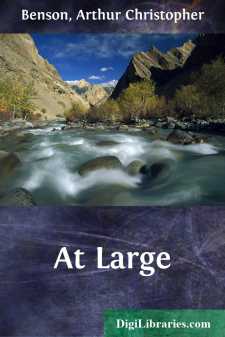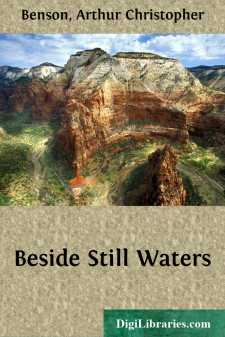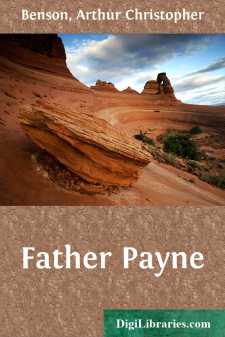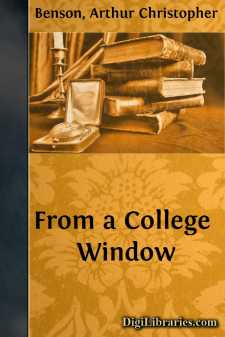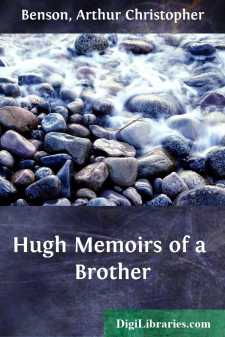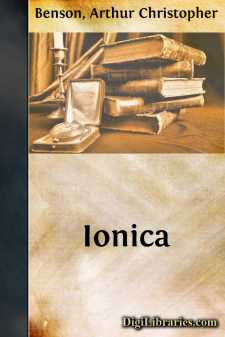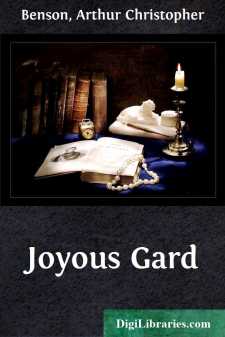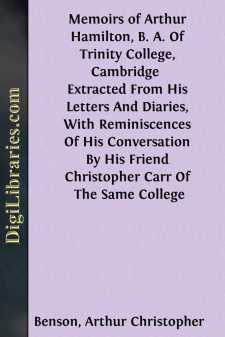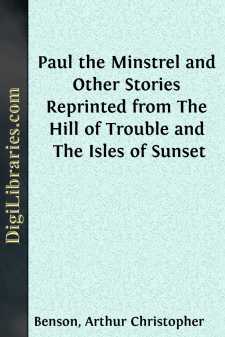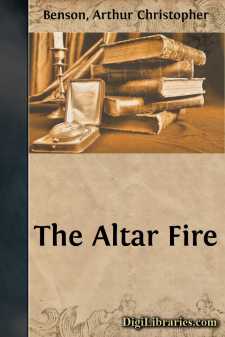Categories
- Antiques & Collectibles 13
- Architecture 36
- Art 48
- Bibles 22
- Biography & Autobiography 813
- Body, Mind & Spirit 142
- Business & Economics 28
- Children's Books 15
- Children's Fiction 12
- Computers 4
- Cooking 94
- Crafts & Hobbies 4
- Drama 346
- Education 46
- Family & Relationships 57
- Fiction 11828
- Games 19
- Gardening 17
- Health & Fitness 34
- History 1377
- House & Home 1
- Humor 147
- Juvenile Fiction 1873
- Juvenile Nonfiction 202
- Language Arts & Disciplines 88
- Law 16
- Literary Collections 686
- Literary Criticism 179
- Mathematics 13
- Medical 41
- Music 40
- Nature 179
- Non-Classifiable 1768
- Performing Arts 7
- Periodicals 1453
- Philosophy 64
- Photography 2
- Poetry 896
- Political Science 203
- Psychology 42
- Reference 154
- Religion 513
- Science 126
- Self-Help 84
- Social Science 81
- Sports & Recreation 34
- Study Aids 3
- Technology & Engineering 59
- Transportation 23
- Travel 463
- True Crime 29
Arthur Christopher Benson
Arthur Christopher Benson (1862–1925) was an English essayist, poet, and academic known for his reflective and introspective writings. He is most famous for his lyric poem "Land of Hope and Glory," which was set to music by Edward Elgar and became an iconic British patriotic song. Benson also served as the Master of Magdalene College, Cambridge, and authored numerous essays and memoirs that explore themes of self-awareness, education, and the beauty of the English countryside.
Author's Books:
Sort by:
I. THE SCENE Yes, of course it is an experiment! But it is made in corpore vili. It is not irreparable, and there is no reason, more's the pity, why I should not please myself. I will ask—it is a rhetorical question which needs no answer—what is a hapless bachelor to do, who is professionally occupied and tied down in a certain place for just half the year? What is he to do with the other...
more...
BESIDE STILL WATERS I The Family—The Scene—The Church—Childhood—Books Hugh Neville was fond of tender and minute retrospect, and often indulged himself, in lonely hours, with the meditative pleasures of memory. To look back into the old years was to him like gazing into a misty place, with sudden and bright glimpses, and then the cloud closed in again; but it was not only with his own life that...
more...
I FATHER PAYNE It was a good many years ago, soon after I left Oxford, when I was twenty-three years old, that all this happened. I had taken a degree in Classics, and I had not given much thought to my future profession. There was no very obvious opening for me, no family business, no influence in any particular direction. My father had been in the Army, but was long dead. My mother and only sister...
more...
THE POINT OF VIEW I have lately come to perceive that the one thing which gives value to any piece of art, whether it be book, or picture, or music, is that subtle and evasive thing which is called personality. No amount of labour, of zest, even of accomplishment, can make up for the absence of this quality. It must be an almost wholly instinctive thing, I believe. Of course, the mere presence of...
more...
I HARE STREET How loudly and boisterously the wind roared to-day across the low-hung, cloud-smeared sky, driving the broken rack before it, warm and wet out of the south! What a wintry landscape! leafless trees bending beneath the onset of the wind, bare and streaming hedges, pale close-reaped wheat-fields, brown ploughland, spare pastures stretching away to left and right, softly rising and falling to...
more...
INTRODUCTION WILLIAM CORY (Johnson) was born at Torrington in Devonshire, on January 9, 1823. He was the son of Charles William Johnson, a merchant, who retired at the early age of thirty, with a modest competence, and married his cousin, Theresa Furse, of Halsdon, near Torrington, to whom he had long been attached. He lived a quiet, upright, peaceable life at Torrington, content with little, and...
more...
PREFACE It is a harder thing than it ought to be to write openly and frankly of things private and sacred. "Secretum meum mihi!"—"My secret is my own!"—cried St. Francis in a harrowed moment. But I believe that the instinct to guard and hoard the inner life is one that ought to be resisted. Secrecy seems to me now a very uncivilised kind of virtue, after all! We have all of us, or...
more...
CHAPTER I He was born November 2, 1852. He was the second son of a retired cavalry officer, who lived in Hampshire. Besides his elder brother, there were three sisters, one of whom died. His father was a wealthy man, and had built himself a small country house, and planted the few acres of ground round it very skillfully. Major Hamilton was a very religious man, of the self-sufficient, puritanical, and...
more...
PREFACE These stories were all written at a very happy time of my life, and they were first published when I was a master at Eton with a boarding-house. A house-master is not always a happy man. It is an anxious business at best. Boys are very unaccountable creatures, and the years between boyhood and adolescence are apt to represent an irresponsible mood. From the quiet childhood at home the boys have...
more...
I had intended to allow the records that follow—the records of a pilgrimage sorely beset and hampered by sorrow and distress—to speak for themselves. Let me only say that one who makes public a record so intimate and outspoken incurs, as a rule, a certain responsibility. He has to consider in the first place, or at least he cannot help instinctively considering, what the wishes of the writer would...
more...


